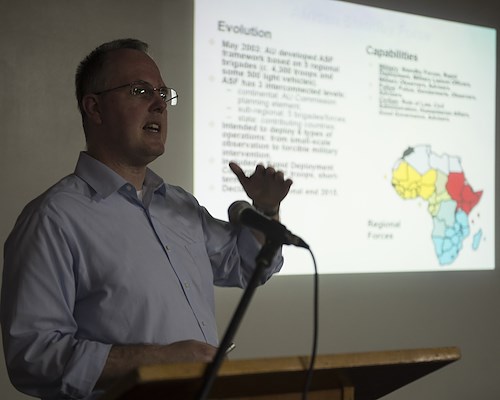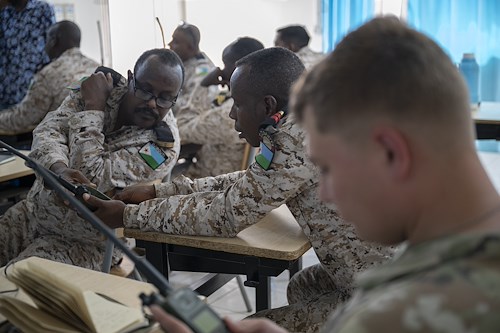Gallery contains 5 images
×
Photo 1 of 5
ACSS stimulates discussion, provides insights into East Africa for staff
Dr. Paul D. Williams, Africa Center for Strategic Studies guest speaker, discusses Africa’s peace and security architecture Mar. 2, 2016, at Camp Lemonnier, Djibouti. The Africa Center for Strategic Studies is a Department of Defense organization dedicated to supporting U.S. foreign and security policies. Combined Joint Task Force-Horn of Africa hosted the ACSS to discuss current issues and to learn more about the countries in East Africa. (U.S. Air Force photo by Staff Sgt. Peter Thompson)
Photo by: Staff Sgt. Peter Thompson
Photo 2 of 5
ACSS stimulates discussion, provides insights into East Africa for staff
Dr. Raymond Gilpin, Africa Center for Strategic Studies academic dean, discusses African contemporary security trends Mar. 1, 2016, at Camp Lemonnier, Djibouti. More than 70 members of the Combined Joint Task Force-Horn of Africa staff attended seminars, which were led by six representatives from the U.S., Europe and Africa. The speakers were selected by the ACSS to discuss topics including violent extremism, peace and security architecture, and security challenges in specific countries for which they are subject matter experts. (U.S. Air Force photo by Staff Sgt. Peter Thompson)
Photo by: Staff Sgt. Peter Thompson
Photo 3 of 5
ACSS stimulates discussion, provides insights into East Africa for staff
Dr. Raymond Gilpin, Africa Center for Strategic Studies academic dean, discusses African contemporary security trends Mar. 1, 2016, at Camp Lemonnier, Djibouti. The Africa Center for Strategic Studies is a Department of Defense organization dedicated to supporting U.S. foreign and security policies. Combined Joint Task Force-Horn of Africa hosted the ACSS to discuss current issues and to learn more about the countries in East Africa. (U.S. Air Force photo by Staff Sgt. Peter Thompson)
Photo by: Staff Sgt. Peter Thompson
Photo 4 of 5
ACSS stimulates discussion, provides insights into East Africa for staff
Dr. Yolanda Bouka, Africa Center for Strategic Studies guest speaker, discusses Burundi current events Mar. 3, 2016, at Camp Lemonnier, Djibouti. More than 70 members of the Combined Joint Task Force-Horn of Africa staff attended a workshop led by six representatives from the U.S., Europe and Africa. The speakers were selected by the ACSS to discuss topics including violent extremism, peace and security architecture, and security challenges in specific countries for which they are subject matter experts. (U.S. Air Force photo by Staff Sgt. Peter Thompson)
Photo by: Staff Sgt. Peter Thompson
Photo 5 of 5
ACSS stimulates discussion, provides insights into East Africa for staff
Burundi National Defence Force Maj. Prosper Hakazimana, Combined Joint Task Force-Horn of Africa foreign liaison officer, asks a question during a seminar Mar. 2, 2016, at Camp Lemonnier, Djibouti. Combined Joint Task Force-Horn of Africa hosted the Africa Center for Strategic Studies to provide academic information and discussions. The seminar included topics related to regional security and current issues impacting East African countries. (U.S. Air Force photo by Staff Sgt. Peter Thompson)
Photo by: Staff Sgt. Peter Thompson
Achieving a stable and secure East Africa with states fully capable of organizing, training and equipping their own forces will be difficult yet achievable in our lifetime, according to experts from the Africa Center for Strategic Studies.
Dr. Raymond Gilpin, ACSS academic dean, compared today’s security force assistance and diplomacy efforts to a time nearly 50 years ago when the U.S. was preparing for its first manned mission to the moon. “It is something that is urgent, something that is difficult, but something we can do,” he said.
To help members of Combined Joint Task Force-Horn of Africa better understand the region, its history and its challenges, representatives from the ACSS shared their expertise and in-depth research on issues impacting East Africa during a workshop Mar. 1-3, at Camp Lemonnier, Djibouti.
The ACSS is a Department of Defense organization dedicated to supporting U.S. foreign and security policies by strengthening the strategic capacities of African states to identity and resolve security challenges. The organization thereby promotes civil-military cooperation and the safeguarding of human rights.
More than 70 members of the CJTF-HOA staff attended the seminars, led by six representatives from the U.S., Europe and Africa. The speakers were selected by the ACSS to discuss topics including violent extremism, peace and security architecture, and security challenges in specific countries for which they are subject matter experts.
“Our intent is to support the command in its desire to focus on recent empirical research, and practical political and security challenges in this area of responsibility from both a scholarly and academic perspective,” Gilpin said. “We show how we can take the analysis being done by others and ourselves and help inform the command in the way it does its business.”
“They provide a level of instruction, discussion and facilitation that gives us insights and knowledge to better our people and to get our people to think more critically about Africa and its issues,” said Lt. Cmdr. Mike Gawlas, CJTF-HOA exercise and training planner and workshop coordinator.
Many of the men and women assigned to CJTF-HOA are expected to become experts on specific subjects, but it is a constant challenge maintaining a high degree of expertise in African issues within the command due to the high turnover rate associated with deployment rotations. The workshop offered a new perspective from individuals who have dedicated their careers to understanding Africa.
“Most of us come here with limited background knowledge of Africa,” Gawlas said. “During turnover we learn about issues on the surface, but we may not completely understand why the issue is there or how it evolved. We brought in these experts to get the next level of analysis and understanding, enabling our workforce to think harder and smarter along the lines of our mission.”
Equipping staff members with greater context and understanding about Arica will help leaders make more informed decisions when determining how to achieve a desired effect or accomplish a line of effort.
“We are not saying do something different; we are saying do something differently,” Gilpin said. “When we bring and moderate conversations like this, hopefully we are expanding the horizons to help influence decision making.”
According to several participants, the seminar not only stimulated intellectual and informed conversations during the event, but around camp as well.
“I think this reenergized the people here,” said U.S. Air Force Capt. Brandon Bierlein, CJTF-HOA attorney. “It has given us a renewed sense of purpose and understanding of why we are here. It has forced people to understand our role is more complex and will require more work, more thought and more planning. From what I’ve seen, our people are up to that challenge.”



















